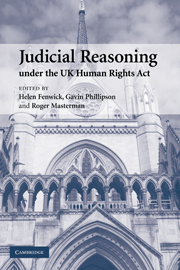Book contents
Preface and acknowledgments
Published online by Cambridge University Press: 30 October 2009
Summary
The project from which this collection grew was undertaken by various members of the University of Durham Human Rights Centre and a number of collaborators between October 2002 and September 2005. The research was funded by the Arts and Humanities Research Council, which accorded it £139,000.
The project set out to examine emerging themes in judicial reasoning under the Human Rights Act 1998. It is the universal experience that states which choose to include a Bill of Rights within their constitutional arrangements confer on the judges a very wide power. To have legitimacy, the exercise of the power must be adequately reasoned and transparent to those beyond the legal community. The effectiveness of constitutional jurisprudence in securing acceptance among the multiple audiences to which it is addressed depends upon the courts being well informed, and in judgments, taken as a whole, demonstrating a degree of internal consistency. Academic commentary on judgments of this kind is an important element in the process. There is a danger under the HRA that much judicial decision-making would be reduced to an ad hoc ‘balancing’ exercise, which is both intellectually unsatisfying and practically of limited value, since it gives so little guidance to the primary decision-makers, whether they be lower courts or officials. Thus, it was intended that the project would aid in providing such guidance to judges, counsel and executive policy-makers.
- Type
- Chapter
- Information
- Judicial Reasoning under the UK Human Rights Act , pp. xi - xiiiPublisher: Cambridge University PressPrint publication year: 2007



